Free Learning Difficulties Including Dyslexia webinars
8 Replies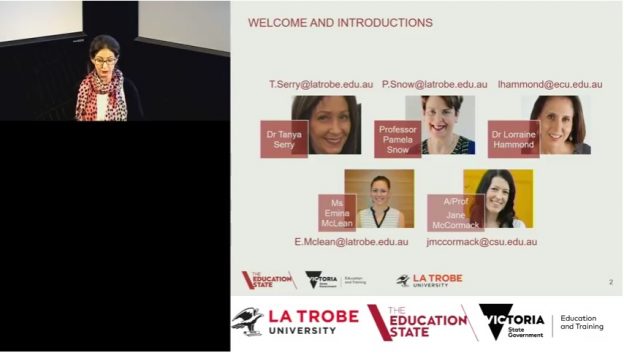
La Trobe University and the Victorian Department of Education have this year collaborated to run workshops across Victoria about learning difficulties including dyslexia. The workshops have been available to teachers and other Department of Education staff.
The information from these workshops is now being made available free online via YouTube as webinars. Wow. Amazingly generous of both the University and the Department, since most professional development of this type and quality is paywalled. So thanks to all involved.
The webinars are presented by Dr Tanya Serry from La Trobe University, and the workshops on which they are based were developed with Professor Pamela Snow, Ms Emina McLean and Assistant Professor Jane McCormack also from La Trobe, and Dr Lorraine Hammond from Edith Cowan University in WA. (more…)
Nobody advocates phonics-only literacy instruction
9 Replies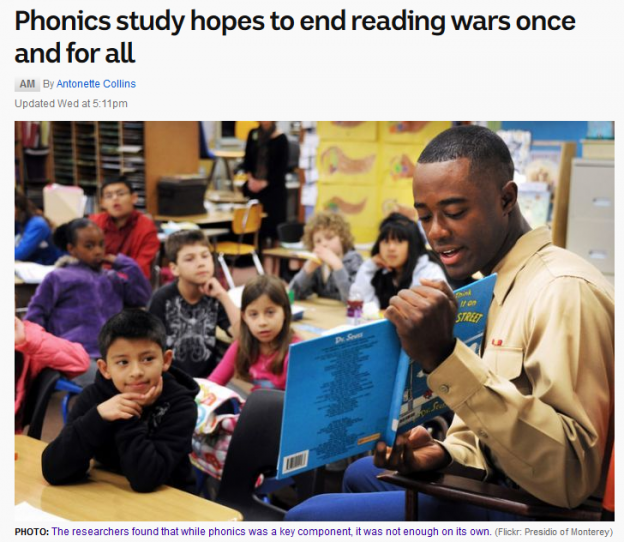
An important article by Anne Castles, Kathleen Rastle and Kate Nation summarising the process of learning to read from novice to expert, and seeking to end the “reading wars”, has just been published.
It’s written in plain English and freely available online. It says that phonemic awareness and phonics are vital and central during the early stages of learning to read, but that a lot of other things are involved in becoming a proficient reader. Please read it and share the link around.
Of course, the media’s antennae tend to be tuned to conflict not consensus, so one newspaper reports this with the headline, “Call off the reading wars, phonics wins: study“. The ABC also interviewed one of the authors, Anne Castles, who said a lot of tremendously sensible things as she always does (you can hear her in a radio report here), and also sought comment from Dr Paul Gardner of Curtin University’s School of Education.
Re ending the “reading wars” he said that, “the problem was with those who advocate phonics as the only approach” and added that “They tend to be people with no classroom experience … from speech pathology, cognitive psychology and think tanks”.
Now, I know not everything is about me, but I reckon I’m probably one of the people he is talking about, since I write a widely-read blog about phonics and am a speech pathologist.
If I wrote a blog about cycling, I’d be very surprised to hear anyone claim I was advocating cycling as the only means of transport. If I wrote a blog about pineapples, I doubt anyone would infer that I was advocating a pineapples-only diet. (more…)
Alternative facts about phonics
14 Replies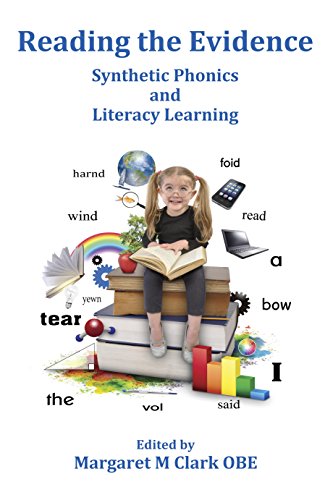
I’ve just read a new e-book called Reading the Evidence: Synthetic Phonics and Literacy Learning, edited by Margaret M Clark OBE, a UK Visiting and Emeritus Professor who the About The Editor section says “has undertaken research on a wide range of topics and has developed innovate (sic) courses”.
Its announcement elicited some e-eye-rolling from members of the Developmental Disorders of Language and Literacy Network, and jovial suggestions that others buy, read and comment on it, but apparently I’m the only one with nothing more important to do (sigh).
Also on my reading list at the moment is The Influential Mind, about how to persuade people in the face of Confirmation Bias, our tendency to ignore or dismiss evidence that’s not consistent with what we already believe. Confirmation Bias is why presenting scientific data to the climate sceptic in your life never works. You can watch a video about it here.
Reading the Clark et al e-book thus also became an interesting exercise in thinking about my own thoughts. I’d set aside time to read the book in order to write what I hoped would be a thoughtful, informed response, but my brain kept coming up with other ideas. Did it keep switching off because of my own confirmation bias, or because of the standard of what I was reading? (more…)
Pip and Tim decodable books from Little Learners Love Literacy
6 Replies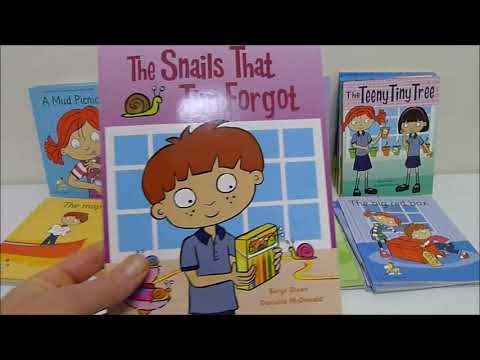
Before I buy a book, I like to pick it up and look through it properly myself.
I also like to hear about it from independent reviewers, not rely on information from those selling it. They’re hardly going to tell me if there’s something wrong with it.
Unfortunately, a lot of excellent books and other resources to help kids learn to read and spell aren’t readily available in mainstream shops.
They’re only available online, or from specialist shops that aren’t always easy to visit. So they’re hard to leaf through, and it’s also difficult to find independent reviews of them.
I’m thus using this blog to help get the message out about good resources I use and recommend from publishers and specialist stores without huge marketing budgets.
I hope this helps more learners get access to them, plus helps those selling them compete with huge companies peddling nasty look-at-the-picture-and-guess books and other dross.
Here’s a video I’ve made about the Pip and Tim decodable books from Little Learners Love Literacy, which I think are perfect for Aussie 4-6 year olds. I use them with some 7-year-old strugglers too. They’re cute, funny and designed to help kids learn to sound out words quickly and well. They’re also available very affordably as iPad apps.
No, I don’t sell these books or get paid any commission on them. I just like them a lot, and hope that (if you have 4-7 year-old literacy learners in your life) you do too.
How many inquiries into literacy education do we need?
4 Replies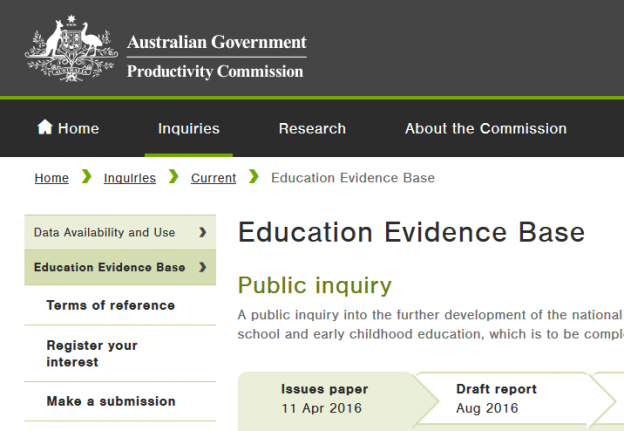
The Productivity Commission is holding an inquiry into the national evidence base for school and early childhood education.
An issues paper is now available (click here to get it), and submissions are open until 25th May 2016. So you’ve got plenty of time to write a submission. But is it worth writing one? Will this inquiry ultimately lead to more evidence-based practice in education? Or will its recommendations be ignored?
The 2005 National Inquiry into the Teaching of Literacy examined the evidence on the teaching of literacy. You can read all about its findings, which are yet to be widely implemented, here.
Former Parliamentary Secretary for Disabilities and Children’s Services Bill Shorten, now the Opposition Leader, also commissioned a report on how to help people with dyslexia, and another comprehensive report can be found here. Its recommendations still haven’t been implemented either.
In 2014 there was also a Teacher Education Ministerial Advisory Group report called Action Now: Classroom-Ready Teachers which said (among other things) that teachers need to be better equipped to teach reading. How well this is being implemented is difficult to know. (more…)
Programs for children with learning difficulties
3 Replies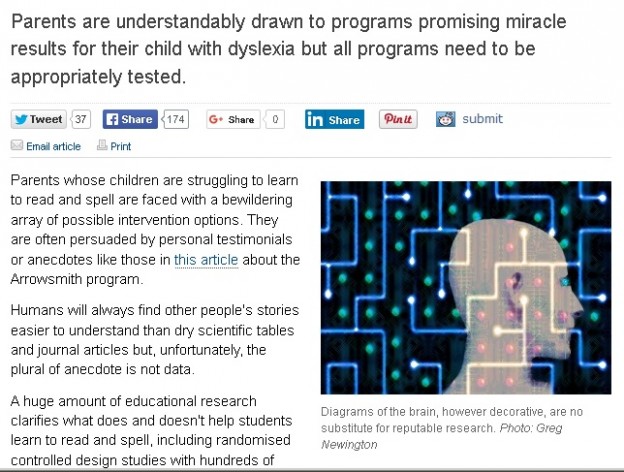
I wrote an opinion piece in yesterday’s online Education Age/Sydney Morning Herald in response to their virtual advertorial last week for the Arrowsmith Program.
My main point was that many programs for children with learning difficulties are nowadays marketed using anecdotes, testimonials and the language and images of neuroscience, but these are not a substitute for independent, peer-reviewed scientific evidence. Parents should ignore them, and instead seek programs based on good science.
I wrote it because I was frankly pretty shocked that a major daily newspaper would run a prominent article about an expensive and controversial program without peer-reviewed research support without seeking comment from independent experts.
Phonics and Early Reading Assessment
5 Replies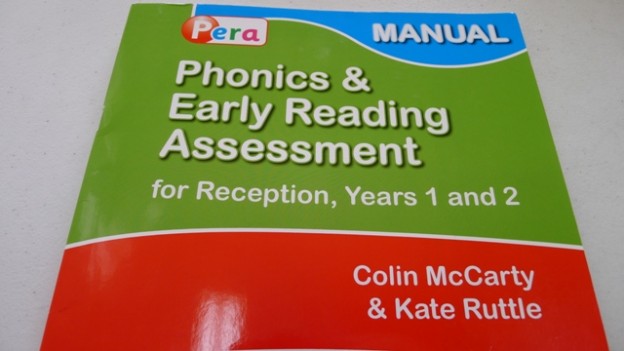
2021 update: this assessment seems to be no longer available.
The Phonics and Early Reading Assessment (PERA) is a new reading test from the UK for children in their first three years of schooling.
Molly de Lemos from Learning Difficulties Australia sent me a review copy and asked me to write about it, as some LDA consultants have been asking for more information on it (thanks, Molly!)
At first pass, it looks like a quick, affordable, objective assessment for specialists working with struggling young beginners, as well as early years classroom teachers who think of literacy as a skill to be actively and systematically taught, not a developmental mystery to be observed unfolding.
I managed to get a friend’s six-year-old, a confident reader, to stop talking about Lego long enough to do the PERA (thanks, G and L), and have also tried it with little boy who has had to work hard to get off the literacy starting blocks (thanks to him and his mum too). And I read the not-at-all-daunting 60-page manual. Here’s what I found out.
Five assessments in one
The PERA is actually five assessments in one:


